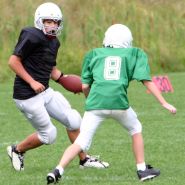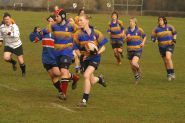American football delivered in a UK school will have little in common with the NFL (which tends to be the most common source of understanding and knowledge about American football in the UK).
The first barrier to successfully introducing it into either a primary or secondary school is to correct the many erroneous assumptions and beliefs about the sport that will be held by school management, parents and indeed the students.
This is probably the greatest barrier to a successful introduction and requires concentrated effort to overcome. It is similar to trying to introduce basic driving lessons to a school where the students and their parents have only ever seen F1 racing. Least of all student expectations will initially be unrealistic.
Away from the extremes of the NFL, ‘American Football’ is an exciting invasion game, a mix of ‘one-pass rugby’ and netball, played in 5v5, 8v8 and 11v11 formats. The game has two basic formats: full contact (Kitted or Tackle Football) and non-contact (Flag Football).
For KS2, 3, 4 & 5 the format would be (in the first instance) 5v5 flag. It is an inclusive sport allowing participants to match their own size and skill-sets to the different positions and therefore it is suitable even for the student that can’t throw, catch or run fast!
As a sport with no gender barriers (true even for the NFL!) male and female students can train and play together as sporting equals. Indeed, with minor changes to game rules, disabled students can fully participate with able-bodied participants.
Case Study
Exmouth Community College (Devon) is a non-selective Academy Comprehensive of approximately 2,500 students from Year 7 to Post-16. The sport’s NGB BAFA (British American Football Association) considers the school a significant development centre and whilst the way the sport is delivered there is unique to the school, it offers interesting and workable variations on the traditional way of delivering training and playing.
With two programme threads – outside of the curriculum through its Sport England/National Lottery funded after-school programme and within curriculum time BAFA’s own schools’ ‘Touchdown Football’ Programme (using Year 11 PE, Year 9 enrichment and Year 12 ASDAN Cope), the school has a very integrated approach to how the sport can be delivered successfully in a variety of ways.
Both programmes teach the same fundamental skills and unlike Rugby and Tag-Rugby, Tackle and Flag Football are the same game differing in only the physical contact and tackling.
Students love it and with after school training sessions running three times a week for Years 10-13 it is only a lack of trained staff that has meant that the sport has yet to be introduced to Years 7-9 on a regular basis. Another challenge in trying to expand a programme in a busy, time and space pressured environment.
The Exmouth Programme offers the most complete model to date of inclusion, from mixed age and gender training playing flag through to the full contact training for both boys and girls through to the ‘Elite’ squad of Year 10 and Year 12 boys drawing from the full spectrum of students – Alternative Curriculum to high-flying A-level students.
The Elite squad ties participation to academic progress and exemplary behaviour (in and out of school) with its motto of ‘Student, Person, Player’. Rather than the segregation of different types of student, the sport by its nature allows integration and inclusion of students with very different skill sets (or indeed the absence of any traditional sporting skill set – especially in tackle football!).
The reason for this is that the game is highly specialised by position – quarterbacks need only throw – one Year 10 female squad on the programme had a female quarterback with a prosthetic lower leg. She could not run but she could throw. One simple rule change and she was perfectly safe to play against any opponent of any age (and she did!).
Centres need only pass the ball and run very short distances. Receivers need to be able to run and catch the ball. In the tackle version of the game, centres only have to hand a ball to the Quarterback and then block the defending player! Perfect for those students who have no sporting ability but tend to get involved in ‘physical situations’ with their peers.
Students involved in full contact are made very aware of the risks and learn to manage those risks as responsible young adults. Training is therefore slow and controlled and based on the acquisition of ‘fundamental skills’ rather than ‘competition readiness’.
The programme has suffered no greater injuries than a few broken fingers (usually due to the ball not being caught properly) demonstrating a good safety record. With its explicit anti-alcohol and drugs message and its strong community & charity emphasis, American Football can offer fun, excitement, novelty, discipline, inclusion, equality, responsibility, healthy lifestyle and teamwork – surely all the things a school would want to promote to its students?
Rob Rooksby, Exmouth Community College.
For more information about the work of BAFA contact: Andy Fuller at andy.fuller@britishamericanfootball.org
Do you teach American Football in your school? Share your experiences below!










